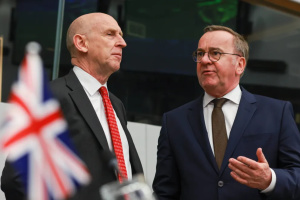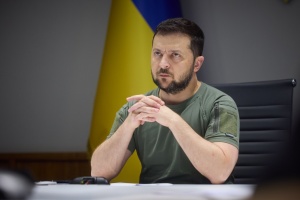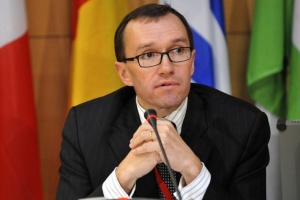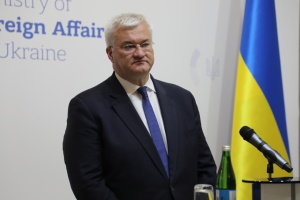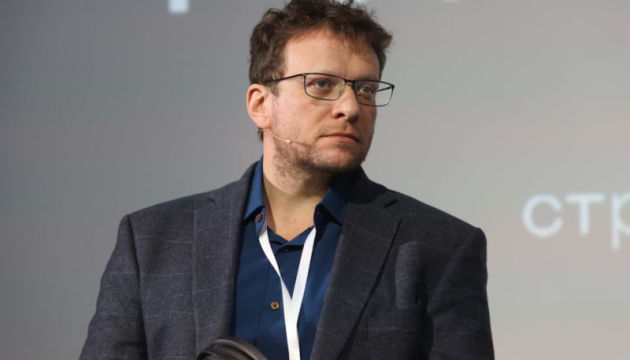
Russians must understand the West will not back down and will stand until the very end — Pomerantsev
One of the participants of the Kyiv Stratcom Forum 2023, which was held in early March, was Peter Pomerantsev — a British writer, journalist, TV producer, and researcher of Russian propaganda. He was born in 1977 in Kyiv into a family of dissidents — poet Igor Pomerantsev and director Liana Pomerantsev. He graduated from the University of Edinburgh; subsequently, for nine years, he worked in Russia.
Peter is the author of Nothing is True and Everything is Possible, which vividly describes modern Russian society and the specifics of Putin’s postmodern dictatorship. Among other things, Pomerantsev, together with his colleagues, collects testimonies of eyewitnesses and victims of Russian crimes in Ukraine.
The Center for Strategic Communication chose the most important points from the extensive material by Pomerantsev in the Huxleў publication about the specifics of the information war with Russia.
According to the author, it is necessary to pay attention first of all to what really works, in particular, the demoralization of the Russian army. In addition, we need to demonstrate the deep gap between the Russian elite and the ordinary people, between the centre and the regions. We should look for the Kremlin’s sore spots and select specific messages for each of the target audiences. Particular attention should be paid to working with a “neutral” audience of Russians who have “withdrawn” from the war. This audience should be shown exactly what the “wise leaders” led them to, encouraged to sabotage the Putin regime.
Pomerantsev believes that the West could pay more attention to information warfare, military and economic support campaigns. The researcher also notes that a key factor of stability for the Kremlin regime is a sense of permissiveness and impunity for crimes like Bucha and Mariupol. Therefore, the Russian political and military elite, as well as propagandists, both senior and ordinary workers, should feel insecure and aware that responsibility is inevitable.
– The current fascist Russia, which unleashed a war with Ukraine in 2022, was formed during 2001-2010. Already at that time, it was a postmodern version of Nazism, well known to us in the twentieth century.
But even if Russia is seen as some kind of impenetrable pole of “absolute evil,” this does not mean that it cannot be influenced.
Information policy should be conducted in close connection with other policies — sanctions, diplomatic, military, etc. A specific goal needs to be formulated at this stage, and we should move towards it. The goal is for the Russian political elites to reconsider strategic priorities. Russia must lose this war.
During World War II, the British stopped assessing how “good” or “bad” those or other Germans were. They were just looking at what worked in practice and what didn’t. The goals were as pragmatic as possible. For example, how can the military be demoralized even more? How to make a division between the elite and the people? Currently, the information strategy for Russia should be formed similarly. Specific information operations should have specific objectives.
Those that would increase the effect of sanctions. Sanctions have not only an economic, but also a psychological dimension.
It is necessary that the Russians form a certain picture of the world, in particular, the perception of sanctions we need. In the face of food shortages, how do the Russians see their future? Who do they blame for their life getting worse every day?
The situation with diplomatic pressure on Russia contributing to its isolation is similar. Take, for example, the methods of sports diplomacy. The fact that Russia was denied participation in the World Cup was an important signal to the international community and to the Russians themselves. However, if we are talking about non-military methods of struggle — economic, diplomatic, sanctions, then the psychological component should not be ignored.
The Ukrainian authorities openly state that Russia is overestimating its chances of victory. They are doing the right thing, constantly citing relevant evidence that the “second army of the world” was not as scary as the Russians wanted it to seem.
The expectation is that the Kremlin, sooner or later, will have to realize that Russia is hopeless, and therefore it is necessary to negotiate on Ukrainian terms! I am very surprised to see that Ukraine understands the importance of the information component of the conflict, but the United Kingdom and the United States do not!
When I raise this question in Washington, I hear the answer: “Yes, you are right. This is very important. But we didn’t plan this war in advance. Our resources are limited. It is unclear who will do this now and how.”
People who determine the information policy must be in direct contact with the first persons of the state who make decisions.
The Ukrainians do the right thing when they do not waste time on meaningless reflection, but simply do the necessary thing. They plan and conduct quite successful information operations, especially those addressed to the Russian military.
Of course, these efforts of the Ukrainians need help from the West. They require the same help in terms of intensity, which we witness in the delivery of weapons and humanitarian supplies. Unfortunately, so far, not much is being done in this direction.
The Russian army will not experience a shortage of cannon fodder. In the end, if things get really bad, the Russians will have one last argument — nuclear weapons. This argument of the Kremlin propagandists supports the psychological stability in the society. Therefore, Ukrainian and Western counter-propaganda should be aimed at demonstrating its incapacity.
We must remember that we are dealing with a dictatorship, not with democracy, where victory in the field of public opinion is never final. However, dictatorship, like democracy, has its own internal logic. They react very sharply to the feeling of loss of control.
The Russian ruling elite must constantly feel insecure and afraid, aware that it has no future, guarantees of not only financial but also personal security. To achieve such an effect, we need to work hard.
If the Russian elites, feeling that they are losing control over the situation, begin to hesitate, rushing from side to side, this will help us push them to political solutions that we can benefit from.
We have to target really sensitive sore spots of the Kremlin. For example, we can assume that the Kremlin actually brought the Buryats to an extreme degree of humiliation. But at the same time, it doesn’t mean that their uprising has some prospect, or that someone in the Kremlin is really concerned about it.
Instead, we know for sure that the Russian leadership is very concerned about the problem of monocities — this topic is not new. We also know how painful the issues of inter-budgetary relations between different regions are — a traditionally vulnerable area in the Russian management system.
If we understand how the Russian system works and know its weaknesses, we can influence them, causing a sense of loss of control. The main thing here is to avoid abstract theories and start to act. We need to constantly try to shake their perception, work in this direction. I am truly sorry that practically no one in the West does this.
About 40% of the Russians feel some inconvenience from existing in the information bubble inflated by Vladimir Solovyov and Channel One. We don’t need to lecture them about democracy or values. There can be only one goal — the end of the war: these 40% should give up, they should be disappointed in the existing regime and accept the opinion that it is inevitable and even necessary to rebuild it.
Read more: “How the World is Fighting the Kremlin Media RT and Its Propaganda.”
Classical journalism is obviously mistaken in its approaches: it is believed that if we tell the truth, inform people about the true state of affairs, this will in some way affect the stability of the authoritarian regime. But the truth won’t change people. There is a need for a completely different theory and practice of communication.
It is necessary to work with the information that will really change the habitual behavior of people in an authoritarian system — only in this way can the end of the war be brought closer.
It is not enough to simply tell the Russians: “Don’t you see what is happening in Bucha and Mariupol?” Even if they do see, it doesn’t mean that their behaviour will automatically change as a result.
To achieve this, we need a different approach to information that goes beyond the romantic notion of a journalistic “code of honor.” Sociologists know that unobvious and strange, at the first glance, things can push people to various choices.
The true motivations of Russian citizens should be thought of only rationally and pragmatically, rejecting various myths. For example, the myth that you can rely on 8–12% of liberal Russians to change the regime.
Information influence zones should be selected pointwise. Some state institutions and social groups that are key to the existence of a corrupt system of governance, and irresponsible Russian officials may be quite promising for such influence.
It is on these most vulnerable spots that it is necessary to inflict not only sanction, diplomatic, but also information blows.
You can start with the simplest and most obvious things. The sanctions lists should include all employees of Russian state institutions and private companies cooperating with them. For example, employees of state television and all production companies that service it. Then for many educated and rich people, the benefits of loyalty to the system will not be so unambiguous.
Information impact must be targeted. There can be no universal message that will affect Russian society as a whole. You need to find a point of vulnerability for each target audience — something that will change its positioning in relation to the state and regime.
But the main thing is what will eventually change the behavior of this target group. From the USSR, we remember that in many ways, it was the behavioral patterns of Soviet citizens that contributed to its stagnation, degradation, and, ultimately, collapse. The behavioral palette here can be the widest — from the Italian strike and sabotage.
For example, the bribe market is the core of the real economy, most of which remains shadow. If the Kremlin can afford to ignore some Western sanctions, can it just as easily turn a blind eye to “the bribe strike”? If people stop giving bribes because they simply will not have money for them, how will the system, impregnated with corruption from top to bottom, react to this?
Telling the world the truth about the essence of the Putin regime and its atrocities in Ukraine is crucial. But it is equally important to demonstrate that Russian officials and propagandists are not unpunished! People should understand that Russia’s propaganda, political and military elites are the defendants.
And these elites themselves must realize that their power is not eternal, that crimes necessarily have consequences. It is necessary to deprive them of a false sense of permissiveness and impunity. People see terrible crimes in Bucha and Mariupol and think: “Is it really possible to do this? Will they get away with it?”
So far, Russian elites do not feel a real threat in response to their crimes. We shouldn’t just talk about the consequences all the time, but also really act upon them. Currently, we are not doing enough in this direction.
Most Russians respect force, only force. If a Russian official, an oligarch, or a propagandist can be punished, they will not be respected — they are weak. It is necessary to deprive the Russian elites of the image of omnipotence in the eyes of the people, to show that there are forces in the world much more influential than Putin and his associates.
But what do the Russians see? They do not witness the real consequences for Putin, they do not feel the vulnerability of the regime, which is totally unstable. On the contrary, they see that Putin has unleashed a war and his power has not shaken.
His subordinates massively kill the Ukrainians and at the same time do not feel any personal discomfort.
The authoritarian model of governance is arranged in such a way that the leader must always demonstrate their success. The leader has to be successful in everything, get away with everything. The leader must lead the people from victory to victory.
It is a very ancient, deep collective instinct to follow the leader as long as they are successful. As soon as the leader fails, the followers turn their backs as well. People cannot keep loyalty to the loser for a long time, so, it triggers “discord and shaking” in their minds.
On such ideas, by the way, relationships within organizations of the mafia type have been built for a long time. For the stability of the Russian picture of the world, this idea of Putin’s “luck” is a crucial thing. The successful resistance of the Ukrainians shook it somewhat, but did not completely destroy it.
We see that the system that ensures the stability of the Putin regime still stands. Propaganda seems to calm, “lull” the consciousness of the Russians, puts it into “sleep mode.”
It is necessary to destroy two main Russian myths: “not everything is so terrible, our difficulties are temporary” and “we will definitely get lucky, luck follows us, God will not allow us to lose.”
People should receive a clear and unequivocal message from all sources: “The West has formed a unified opinion about the future of Putin’s Russia. It will not back down and will stand until the very end. It will definitely achieve its goal because it has much greater economic potential and other resources compared to Russia.”
The fact that people do not hear this 24/7 through all the imaginable and unthinkable channels of communication is bad. The defeat of Russia for the above reasons will still happen, but with a competent information policy, this could happen much faster.
It seems to me that the “theory of Ukrainian victory” is to convince the Russians of the impossibility of defeating Ukraine on the battlefield. And powerlessness inevitably generates disappointment and despair. Therefore, the Russians will have to change their behavior, start acting and living differently.
Center for Strategic Communication and Information Security

